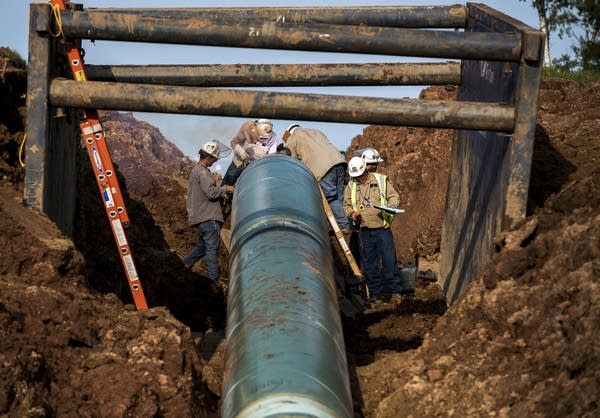Minnesota Supreme Court rejects Line 3 pipeline challenges

Go Deeper.
Create an account or log in to save stories.
Like this?
Thanks for liking this story! We have added it to a list of your favorite stories.
Updated: 6:20 p.m. | Posted: 3:01 p.m.
The Minnesota Supreme Court has declined to take up challenges by tribal and conservation groups to the environmental review of Enbridge Energy's proposal for replacing its aging Line 3 crude oil pipeline across northern Minnesota.
The decision means that Minnesota regulators can begin the process of fixing the environmental review of Enbridge Energy’s controversial proposed $2.9 billion project.
The project could have faced a long delay if the high court had agreed to hear the appeals.
It’s unclear exactly when construction of the pipeline could begin. The project needs several environmental permits, as well as final approval from the Minnesota Public Utilities Commission, which likely will spur additional lawsuits.
Turn Up Your Support
MPR News helps you turn down the noise and build shared understanding. Turn up your support for this public resource and keep trusted journalism accessible to all.
Calgary, Alberta-based Enbridge said the decision means that the utilities commission can now move forward with addressing one deficiency in the environmental impact statement identified by the Minnesota Court of Appeals.
That court upheld most of the environmental review in June, but sent the case back to the PUC for further work because the review did not address a possible spill in the Lake Superior watershed.
Tribes and environmental groups applauded that part of the ruling. But they appealed the rest to the Supreme Court, arguing that the environmental review didn’t adequately assess the pipeline’s impact on climate change, and failed to sufficiently analyze possible harm to tribal and cultural resources.
“We are profoundly disappointed that the Minnesota Supreme Court felt more interested in siding with the rights of a Canadian corporation to proceed with a high-risk project than protecting the rights of the Minnesota Anishinaabe and indigenous people and the rights of nature,” said Winona LaDuke of Honor the Earth, one of the groups that appealed the decision.
The decision sends the matter back to the Public Utilities Commission. In a statement, Chair Katie Sieben said the commission would take up the issue of the adequacy of the Line 3 environmental impact statement as soon as possible.
“Now that the Commission has been granted jurisdiction again over this proceeding, we will meet in the near future to act on the adequacy of the EIS (environmental impact statement) and determine what additional information needs to be obtained to supplement this record,” Sieben said.
Enbridge in a statement said it’s confident the PUC will soon provide guidance on the remaining progress and schedule.
Line 3 is part of a network of pipelines Enbridge operates from Alberta, Canada, across northern Minnesota to its hub in Superior, Wis. that together transport nearly 3 million barrels of oil per day. Some of that oil feeds refineries in the Twin Cities. The majority is shipped to other refineries in the Midwest and on the Gulf Coast.
For more than four years Enbridge has worked to win regulatory approval in Minnesota to replace Line 3, which is corroding, requires regular maintenance and has a history of spills. The pipeline has already been replaced in Canada and Wisconsin.
“It's been a long road for this project,” said Nancy Norr with the pro-pipeline group Jobs for Minnesotans, in praising the Supreme Court decision. “This is a safety and maintenance project intended to protect the environment."
Line 3 would follow a new route across northern Minnesota, one that opponents say threatens lakes, rivers and wild rice beds with potential oil spills. They also argue that transporting hundreds of thousands of barrels per day of heavy crude from Canada’s oil sands region would exacerbate climate change.
Enbridge still needs to acquire several environmental permits from state agencies, as well as the U.S. Army Corps of Engineers, before it can begin construction on the pipeline.
Those can’t be issued until the Minnesota Public Utilities Commission approves an updated environmental review, something that would likely trigger additional lawsuits from tribes and environmental groups.
Enbridge said it will have a better idea of its construction timeline after the commission provides a schedule detailing how it intends to proceed.


